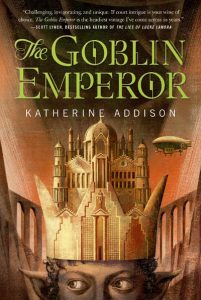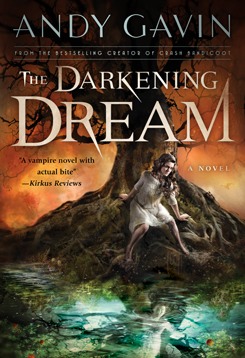 Title: The Goblin Emperor
Title: The Goblin Emperor
Author: Katherine Addison / Sarah Monette
Genre: High Fantasy
Length: 447 pages
Read: February 22-4, 2015
Summary: A fabulous little jewel-box of a book
I found this book on a list of Hugo/Nebula award candidates and it had me at the title.
The youngest, half-goblin son of the Emperor has lived his entire life in exile, distant from the Imperial Court and the deadly intrigue that suffuses it. But when his father and three sons in line for the throne are killed in an “accident,” he has no choice but to take his place as the only surviving rightful heir.
Pretty good setup actually, and the book drops the bombshell by page two. I was hooked right away and dragged through all 447 pages in 48 hours. I love when that happens. Most books are a bit of a chore and when you find one that isn’t… well it’s great.
But while griping, GE isn’t your typical action novel. Addison/Monette’s writing is gorgeous. Not in a highly stylized way, as the prose is straightforward and easy to follow, but there is a certain elegant tone. This is a tight third person from the Emperor’s point of view and his voice deserves credit for a large part of the charm. What isn’t so easy to follow is the byzantine (and authentic feeling) names of the courtiers. Or the near pervasive use of the formal first person. We were required to use all of our mental facilities to remember the large cast, to differentiate members of the same family by small suffixes, to decode their genders and marital relationships from their formal prefixes, and to remember that under different circumstances or times the same personage may be called by entirely different names. Not entirely unlike our royal experiences with Anna Karenina.
Back to the informal first person. Despite these challenges, and the near absence of any action, and a certain lack of agency on the part of the protagonist — the book is great.
The world feel is both complex and realistic (in a fantasy) way and our immersion into the emperor’s like-able little self and his intriguing situation highly entertaining. The slightly naive tone is perhaps a feature. The author is quite adept in her use of detail and language to sketch (it’s not ponderously descriptive) this detailed realm. She hints at a jeweled nobles and scintillating chambers. The names are unpronounceable but evocative. The world feels Renaissance, with a bit of steam tech, a hint of World of Warcraft, a touch of humor, and a lightly used magic and mysticism. An elvish venice minus the canals.
The Emperor Maia is sympathetic and engaging, although perhaps his narrative ability to gauge the meaning and veracity of others borders on magical. His staff and friends are often charming, if not always overly complex. He tries to do the right thing, and it generally work out for him, which is hard to resist.
The author seems almost afraid of action. My biggest gripe with the novel is the curt and abbreviated action (all two scenes of it) and the perfunctory “resolution” to the central drama. The whole mystery pretty much resolves itself in about 2 pages without the protagonist doing much. In fact the action makes him nauseous. Then we are granted a nice long dénouement where everything is wrapped up neatly, including just about every relationship in the book. It’s forced sure, but the artful and artificial structure of the novel softens the blow.
The bottom line: if you like the immersive quality of fantasy, and don’t mind pawing through some long elvish names, this is a lovely and absolutely first rate novel.
I should note that Katherine Addison is actually Sarah Monette, a well regarded but lackluster selling fantasy author. As she herself says on her blog, “because publishing is deeply, deeply weird” she was unable to sell this rather lovely little novel under her own name, but “brand new debut author” (aka pseudonym) Katherine Addison could. Obviously: a) all those readers who didn’t buy her previous books have committed to memory her actual name, and would never buy her new book because of the ill feelings brought on by not noticing her earlier books. b) There is a telepathic hate list of poor selling authors imprinted in the brains of all would be readers. c) Telepathy is not used, but instead racial memory is a fact and not selling well is an archetype. Or d) genius buyers at book store chains are easily fooled by name changes.



